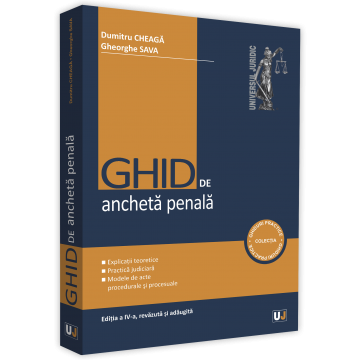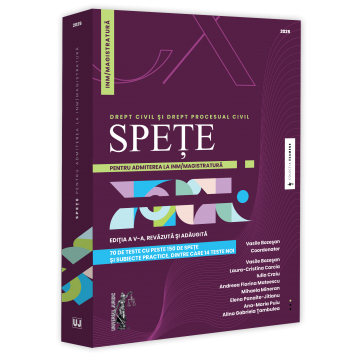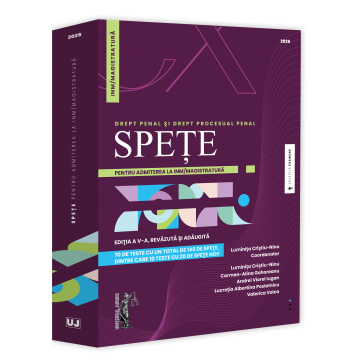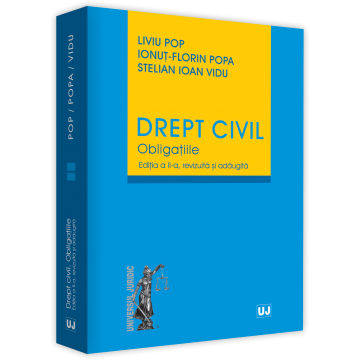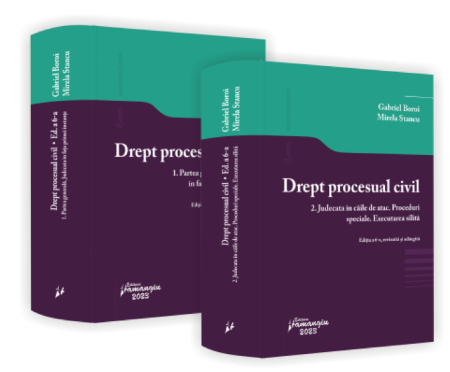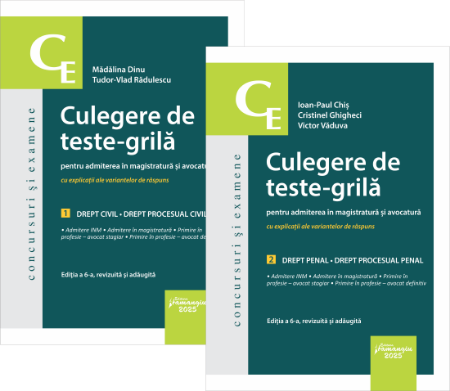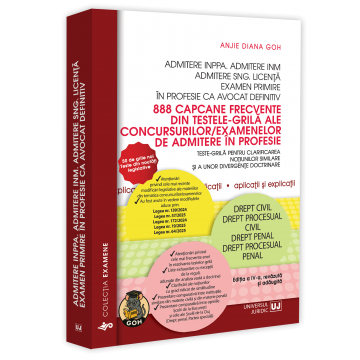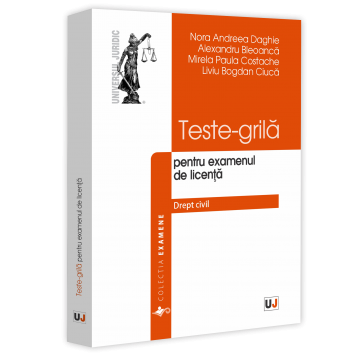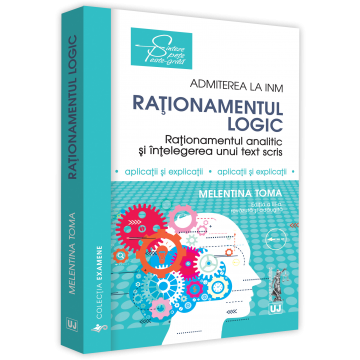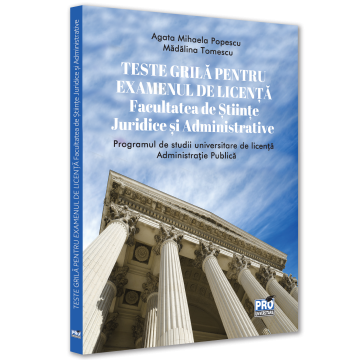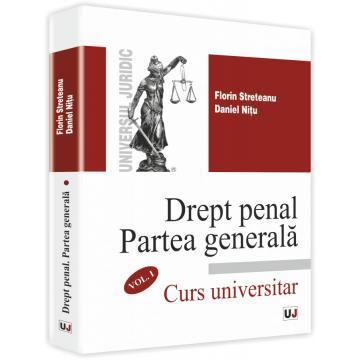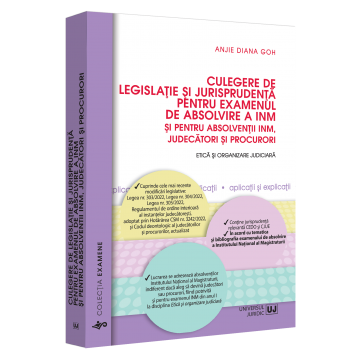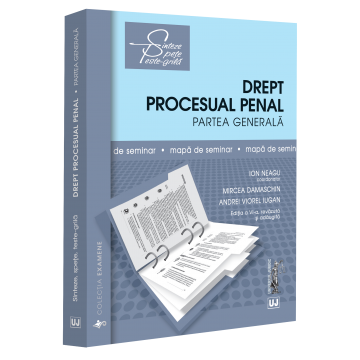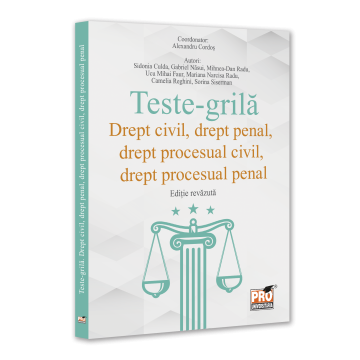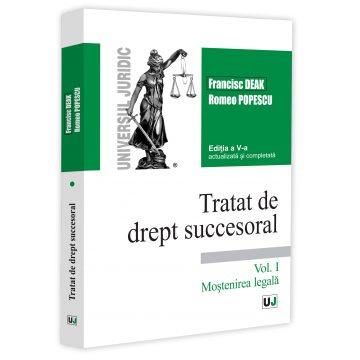6359.png) The right to a fair trial. Civil issues. Judgments of the European Court of Human Rights in cases against Romania - Vol I + vol. yl
The right to a fair trial. Civil issues. Judgments of the European Court of Human Rights in cases against Romania - Vol I + vol. yl
6359.png)
ISBN: 978-606-28-0272-1
DOI: 10.5682/9786062802721
Publisher year: 2017
Edition: I
Pages: 1048
Publisher: Editura Universitară
Author: Mihaela Vasiescu, Paula-Andrada Cotovanu, Beatrice Ramascanu, Alexandra Lancranjan, Cristina Radu, Florin Mihaita, Anamaria Lucia Zaharia, Lavinia Circiumaru, Ionut Militaru, Victor Horia Dimitrie Constantinescu, Dragos Calin - Coordonator, Alexandra Gherghesanu, Vasile Bozesan, Iulian Balan, Cristinel Ghigheci
- Description
- Download (1)
- Authors
- More details
- Reviews (0)
Pursuant to Article 6, paragraph 1, of the Convention, “a person shall have the right to a fair trial, in public and within a reasonable time, by an independent and impartial tribunal established by law, which shall decide either violation of his civil rights and obligations, or on the merits of any criminal charge against him. The decision must be made in public, but access to the courtroom may be denied to the press and the public for the duration of the trial or part of it, in the interests of morality, public order or national security in a democratic society. when the interests of minors or the protection of the privacy of the parties to the trial so require, or to the extent deemed absolutely necessary by the court when, in special circumstances, publicity would be likely to harm the interests of justice. "
From a civil point of view, in order for art.6 par.1 to become applicable, several conditions must be met: a) there must be a contestation regarding “a right that can be claimed”, valued by way of an action in justice, in the domestic law system; b) the appeal to be “real and serious”, it can concern both the existence of the right and the extent or the ways in which it is exercised; c) the result of the procedure to be "direct and indeterminate" regarding the existence of the right.
The guarantees of a fair trial presuppose the right to a court, independent and impartial, established by law.
The guarantees regarding the development of the procedure take into account: the principle of equality of arms; hearing in the presence of the parties; the principle of adversariality; evidence administration: the principle of direct evidence administration; the person's right to have his or her case examined properly; publicity of the procedure; the orality of the procedure; reasonable time; motivation of decisions and res judicata, in accordance with the principle of legal security, etc.
The judgments pronounced against Romania by the European Court of Human Rights are abundant regarding the violation of art.6 par.1 and art.1 of the Protocol no.1 additional to the Convention, and the present volumes select typologies, precisely for a simpler consultation for the readers sai. The conclusions of the 10 volumes published under the name “Judgments of the European Court of Human Rights against Romania. Analysis, potentially responsible authorities, consequences 1994-2014 ”by the University Publishing House from Bucharest, in the period 2010-2015. In the matter of non-execution of court decisions, the paper makes a simple selection of typologies, the exhaustive presentation being included in the volume “Forced execution. Judgments of the European Court of Human Rights pronounced in cases against Romania ", published by the same authors, in 2015, at the University Publishing House, coordinator Vasile Bozesan.
This paper can be a necessary tool for the university environment, magistrates and lawyers, as well as a very useful source of reference for any other people who want to be properly informed on the legal space of the issues discussed in the field of fair civil proceedings.
-
Dreptul la un proces echitabil. Aspecte civile. Hotarari ale Curtii Europene a Drepturilor Omului pronuntate in cauzele impotriva Romaniei - Vol I+vol. II
Download
Judge, Targu Mures Court of Appeal, vice-president, doctor of law, member of the scientific college of the Jurisclasor ECHR magazine.
Paula-Andrada Cotovanu
Judge Ploiesti Court of Appeal, judicial inspector, Judicial Inspection, member of the editorial board of the ECHR Jurisclasor Magazine, member of the editorial board of the Forumul Judecatorilor Magazine.
Beatrice Ramascanu
Judge, Ploiesti Court of Appeal, trainer of the National Institute of Magistracy, member of the scientific college of the Jurisclasor ECHR magazine, doctor of law.
Alexandra Lancranjan
Prosecutor, National Anticorruption Directorate, trainer of the National Institute of Magistracy.
Cristina Radu
Judge at the Ploiesti Court of Appeal, member of the editorial board of the ECHR Jurisclasor Magazine.
Florin Mihaita
Judge, Bucharest 4th District Court, editor-in-chief of Jurisclasor ECHR magazine, member of the editorial board of Forumul Judecatorilor Magazine.
Anamaria Lucia Zaharia
Judge, Bucharest Court of Appeal, trainer of the National Institute of Magistracy for continuous professional training in commercial law, representative of the Romanian Section of GEMME - European Group of Magistrates for Mediation; member of the editorial board of Forumul Judecatorilor Magazine, member of the editorial board of Jurisclasor ECHR Magazine.
Lavinia Circiumaru
Judge, Bucharest Tribunal, member of the editorial board of the ECHR Jurisclasor Magazine.
Ionut Militaru
Judge, Bucharest Court of Appeal, editor-in-chief of the Forum of Judges Magazine, doctor of law, co-president of the Romanian Judges Forum Association, president of the Association of European Magistrates for Human Rights, editorial director of the ECHR Jurisclasor magazine.
Victor Horia Dimitrie Constantinescu
Judge, District 6 Court of Bucharest, member of the editorial board of Forumul Judecatorilor Magazine, member of the editorial board of Jurisclasor ECHR magazine.
Roxana-Maria Calin
Judge, Bucharest Tribunal, deputy editor-in-chief of the Forum of Judges Magazine, vice-president of the European Association of Magistrates for Human Rights, member of the editorial board of the ECHR Jurisclasor magazine.
Dragos Calin - Coordinator
Judge at the Bucharest Court of Appeal, trainer of the National Institute of Magistracy for continuous professional training European Union law, international judicial cooperation in civil and commercial matters, labor law and social insurance law; associate scientific researcher of the Institute of Legal Research of the Romanian Academy - Center for European Law Studies, director of the Journal of Judges Forum, member of the scientific college of the journal Jurisclasor ECHR, co-editor of the Journal Judges of Romania (2007-present), member of the Board of Directors of GEMME Europe (May 2010-present), vice-president of GEMME Europe - European Grouping of Magistrates for Mediation (May 2010-May 2012), founding member of CIMJ (International Conference of Mediation for Justice), October 2009, Paris.
Alexandra Gherghesanu
Judge, Iasi Court of Appeal, trainer of the National Institute of Magistracy, member of the editorial board of the Forum of Judges Magazine, deputy editor-in-chief of the Jurisclasor ECHR magazine.
Vasile Bozesan
Judge, Teleorman Tribunal, member of the editorial board of Forumul Judecatorilor Magazine, member of the editorial board of Jurisclasor ECHR magazine.
Iulian Balan
Judge, Targu Mures Court of Appeal.
Cristinel Ghigheci
Judge, Brasov Court of Appeal, trainer of the National Institute of Magistracy, doctoral lecturer at the Faculty of Law of the Transilvania University of Brasov. member of the editorial board of Forumul Judecatorilor Magazine, member of the editorial board of Jurisclasor ECHR Magazine.
Pursuant to Article 6, paragraph 1, of the Convention, “a person shall have the right to a fair trial, in public and within a reasonable time, by an independent and impartial tribunal established by law, which shall decide either violation of his civil rights and obligations, or on the merits of any criminal charge against him. The decision must be made in public, but access to the courtroom may be denied to the press and the public for the duration of the trial or part of it, in the interests of morality, public order or national security in a democratic society. when the interests of minors or the protection of the privacy of the parties to the trial so require, or to the extent deemed absolutely necessary by the court when, in special circumstances, publicity would be likely to harm the interests of justice. "
From a civil point of view, in order for art.6 par.1 to become applicable, several conditions must be met: a) there must be a contestation regarding “a right that can be claimed”, valued by way of an action in justice, in the domestic law system; b) the appeal to be “real and serious”, it can concern both the existence of the right and the extent or the ways in which it is exercised; c) the result of the procedure to be "direct and indeterminate" regarding the existence of the right.
The guarantees of a fair trial presuppose the right to a court, independent and impartial, established by law.
The guarantees regarding the development of the procedure take into account: the principle of equality of arms; hearing in the presence of the parties; the principle of adversariality; evidence administration: the principle of direct evidence administration; the person's right to have his or her case examined properly; publicity of the procedure; the orality of the procedure; reasonable time; motivation of decisions and res judicata, in accordance with the principle of legal security, etc.
The judgments pronounced against Romania by the European Court of Human Rights are abundant regarding the violation of art.6 par.1 and art.1 of the Protocol no.1 additional to the Convention, and the present volumes select typologies, precisely for a simpler consultation for the readers sai. The conclusions of the 10 volumes published under the name “Judgments of the European Court of Human Rights against Romania. Analysis, potentially responsible authorities, consequences 1994-2014 ”by the University Publishing House from Bucharest, in the period 2010-2015. In the matter of non-execution of court decisions, the paper makes a simple selection of typologies, the exhaustive presentation being included in the volume “Forced execution. Judgments of the European Court of Human Rights pronounced in cases against Romania ", published by the same authors, in 2015, at the University Publishing House, coordinator Vasile Bozesan.
This paper can be a necessary tool for the university environment, magistrates and lawyers, as well as a very useful source of reference for any other people who want to be properly informed on the legal space of the issues discussed in the field of fair civil proceedings.

![The right to a fair trial. Civil issues. Judgments of the European Court of Human Rights in cases against Romania - Vol I + vol. yl [1] The right to a fair trial. Civil issues. Judgments of the European Court of Human Rights in cases against Romania - Vol I + vol. yl [1]](https://gomagcdn.ro/domains/editurauniversitara.ro/files/product/large/dreptul-la-un-proces-echitabil-aspecte-civile-hotarari-ale-curtii-europene-a-drepturilor-omului-pronuntate-in-cauzele-impotriva-romaniei-vol-i-vol-ii-458-758873.jpg)
